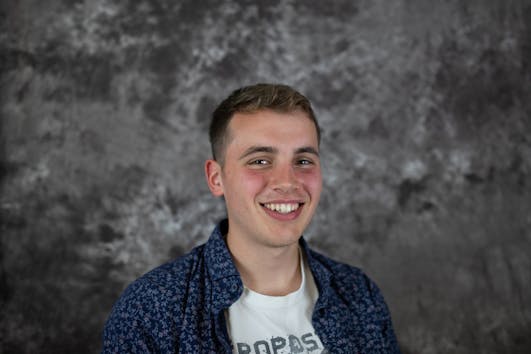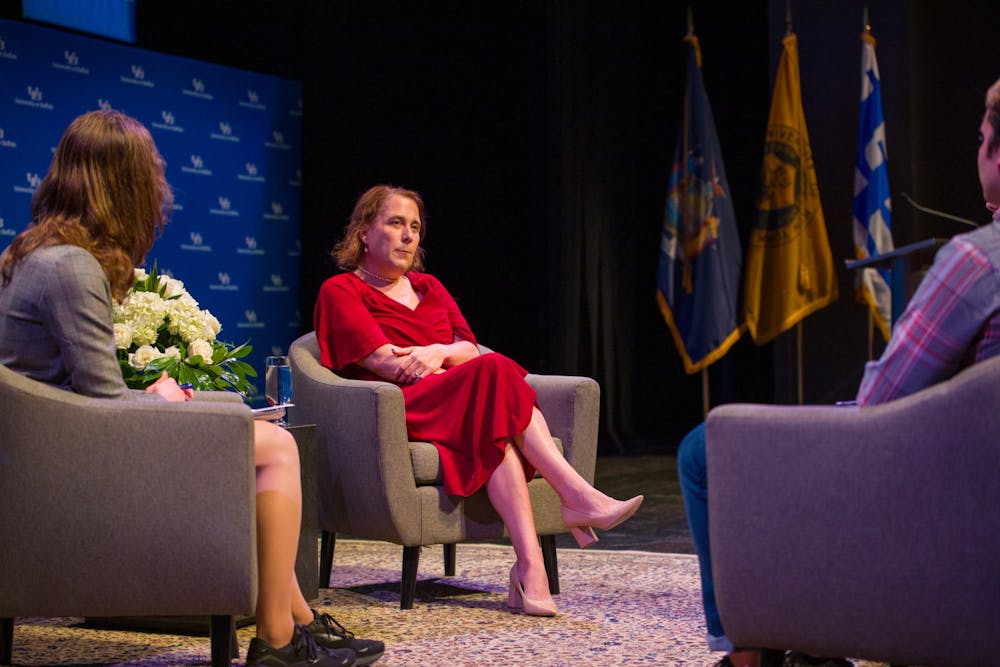In 2021, Amy Schneider was a software manager in Oakland, California.
Two years and 40 “Jeopardy!” episodes later, Schneider is the holder of the second-longest winning streak in the show’s history, a nationally known figure and $1.6 million richer.
Schneider sat down with The Spectrum this Thursday before her Distinguished Speakers Series talk to discuss being a trans woman in the public eye, being her own boss and life after “Jeopardy!”
This interview has been edited for length and clarity.
The Spectrum: How did you adjust to being in the national spotlight?
Amy Schneider: “You know, it just sort of happens. I’ve had to deal with it, to an extent. I realized that it was something that I was suited to. I found out that I enjoyed everybody paying attention to me, so that certainly helped. I quit my day job and I’ve just sort of been focusing on things like this. Not having a boss has been hard. Having to be accountable to myself, be my own boss, and know how to manage my time and how to prioritize — that’s all something I’m still kind of figuring it out.”
TS: Obviously, your life has changed a whole lot. Is there a thing or person who has been a constant through all the change?
AS: “Certainly, my wife Genevieve has been crucially important. This isn’t something that she wanted. She has no desire to be a public figure, and it’s been tough for her at times. We go out to things and everybody wants to talk to me, and she gets ignored. It can be hard, but her — and our cats Meep and Rue have been really important.”
TS: So many trans people have the experience of needing to come out again and again. How did it feel doing that on such a big stage?
AS: “It turns out it was a great thing. It was something that I kind of had some nervousness about. Being trans in public is not always the safest thing. But what I didn’t realize it was going to do was force me to to deal with some lingering dysphoric issues. Just having to watch myself on TV over and over again, and hear myself, and have everybody respond so positively made me realize that other people seem to like me, and that I could maybe like myself a little bit more. But I think it is sort of the thing about being trans: you’re out there all the time. You can’t hide it. Being on TV is an escalation of that, but it’s also the same thing, really, just on a slightly bigger scale. So, to an extent, you’re just sort of used to it. Anybody who wants to notice, or comment, or ask weird questions or whatever — that’s just always a risk whenever you leave your home.”
TS: Speaking of home, the political climate in Ohio has moved to the right over the past 10-15 years. It’s not really a purple state anymore. What was going home to Ohio like with all this fame?
AS: “It’s certainly something I was conscious of the first time I went home, but I’m from Dayton, which is a pretty welcoming, accepting place. And, ultimately, I think that as much as there is a political movement that is opposed to trans people in the abstract, I found that there are really not that many people who have any interest in — I don't know — conflict, or whatever, with an actual, individual trans person that they come across. People are just busy living their lives. They may be voting one way or another, but if you’re running into them at the grocery store, they’re just going to let you be.”
TS: Right, it’s less nebulous when it’s a single person.
AS: “Right, and people have these political views because of stereotypes they have — stereotypes that I was raised with, that everybody used to have — and they’re not true. It’s hard to maintain that fear and that anger about this mythical thing when you meet someone, and it turns out that they’re not that mythical thing.”
TS: So what’s next for you?
AS: “Great question. I wish I knew. I’ve been so focused on this book for the last year and a half, and now I’m trying to figure that out. But one thing I know I want to do is I’m on the board of Equality California, which is a nonprofit out there, and I want to be more active with them. California is such a liberal state, but it also has a lot of conservative areas in it, and there’s a lot of school boards that have gotten hijacked by extremists in California. So I want to be doing what I can to bring attention to that, and to try to help the kids in those districts however I can.”
TS: And that kind of goes back to being your own boss, because you don’t have someone who’s telling you, “You need to work on this project, you need to do this, you need to go here.” But that’s kind of scary, almost, because you have so many options.
AS: “Definitely. And I never get a status report. I never know how I'm doing, and am I really making the right choices? Are these the best things for me to be prioritizing? I just have to do it, and trust that it’s all going to work out.”
TS: The tour schedule is generally a whirlwind, but have you gotten a chance to go anywhere in Buffalo so far?
AS: “No, not really. I’ve traveled so much in the past couple of years, and I rarely get to see anywhere that I’m at. But it has been nice seeing the fall colors. I don’t really have that in Oakland, so at least I’ve seen that.”
TS: Do you ever watch any other game shows?
AS: “Not really. I watched a lot of ‘The Price is Right’ as a kid. A lot of people ask me, ‘What other game show do you want to be on?’ And this was the only one I ever really had in mind, you know, unless you count ‘The Great British Baking Show’ or things like that — or ‘Glow Up,’ about makeup artists.”
TS: Was that an ambition you had for a long time, to be on “Jeopardy!”?
AS: “Yeah, I grew up watching it, my parents watched it, so it’s always been in the background. And I was a good student, so, yeah, it was always kind of the plan at some point to be on there.”
TS: When you watch your first episode on “Jeopardy!,” you seem a little more excited than you do toward the end. How did you feel 40 episodes in compared to when you were starting? Did you start to feel worn out at all?
AS: “Oh, definitely. Yeah, it was really a grind. I mean, it’s long days, you’re doing five episodes in a day, and it just requires so much focus. It did start to feel routine in a way that I kind of resisted, because I wanted to keep that edge going. But as much as I would tell myself every time, ‘You’ve got to focus. This could be it. This could be the last one,’ after 30 or 40 times, your brain just stops believing it. It’s like, ‘Oh, it’s gonna be fine. You’re just gonna win again.’ And then that became sort of the opposite of a self-fulfilling prophecy, like a self negating prophecy.”
Grant Ashley is the editor in chief and can be reached at grant.ashley@ubspectrum.com
Sol Hauser is a news editor and can be reached at sol.hauser@ubspectrum.com

Grant Ashley is the editor in chief of The Spectrum. He's also reported for NPR, WBFO, WIVB and The Buffalo News. He enjoys taking long bike rides, baking with his parents’ ingredients and recreating Bob Ross paintings in crayon. He can be found on the platform formerly known as Twitter at @Grantrashley.





